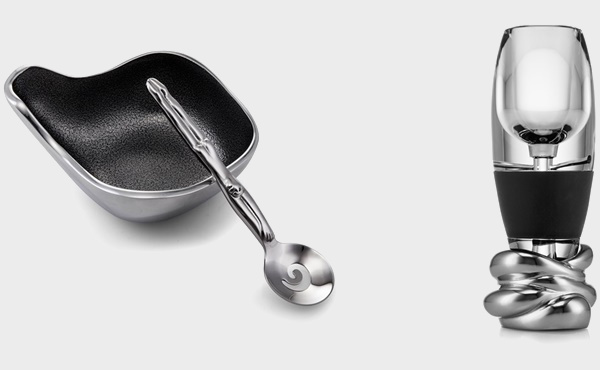While the age-old saying ‘if you fail to plan, you are planning to fail’ unfortunately proves to be true for many start-up businesses, this doesn’t apply to South-African based Carroll Boyes.
The artist and designer successfully established her brand within six months in 1989, without a business plan to guide her through. Her company, Carrol Boyes, designs, manufactures and distributes over 1,000 hand-crafted metal homeware, giftware, flatware and tabletop products in countries such as North America, UK, Europe, South America, Asia, Scandinavia, New Zealand, Middle East, Africa and now Australia.
Boyes started the company in her basement, after she decided to quit her teaching job of 12 years at the age of 35 and pursue her childhood dream of becoming a full-time artist. She knew she needed to create something that was not only functional but an essential part of everyday life so people could enjoy it, which inspired the launch of her first range of copper candlesticks.
It was a matter of being in the right place at the right time for Boyes after both the interior décor boom in South Africa and the opportunity to display her products in the quirkiest shop in Cape Town boosted her company’s success.
From then on, the Carrol Boyes range grew exponentially, doubling in size every year and even surpassing her most ambitious forecasts. The company now employs over 250 people ranging from administration, marketing, operations to manufacturing, wholesale and retail.

“I’m proud of all the accomplishments the Carrol Boyes brand has achieved since its inception,” says Boyes.
“It all started from a passion to create a beautiful range of functional homeware products. We are so proud to be internationally acclaimed and continuing to grow every year.
“I know most businesses today take at least two years to mature. The fact that I gave myself six months was terribly naïve but maybe one needs to be naïve and crazy to make their dreams a reality.
“Having said that, I knew I had a business that was working then, but I didn’t know whether the business would be working in a year’s time or 10 years time. I was never confident of that and I think you should never be confident. If you get confident, you change and become arrogant. You have to keep proving yourself over and over again.”
Boyes recently moved into other product categories and launched a wine business in South Africa, with the latest collection being a limited edition champagne consisting of only 1,000 bottles.
Made in France, the newly released champagne is made in partnership with Charbout, a three-generations-old French family vineyard, which was established in 1936 on the hillsides of Champagne country.
While enjoying great success, one of the biggest challenges for the company has been creating brand awareness on a global scale while working with a limited budget. The key was networking with others and never underestimating the power of word of mouth referrals when customers share their journey with others, says Boyes. Here she shares her five tips for overseas success:

1 product
The key to success in retail is largely about the product and ensuring it appeals to the target market in terms of design, functionality and quality. It’s important to pay attention to detail and ensure the product is design-led and can stand alone in its own right. Customers should ‘see’ and ‘experience’ the brand clearly.
2 route to market
From the beginning, it’s crucial to clearly define your route to market―which channel do you want your product to be exposed to? Will it be through an independent store, a range of stockists, large department stores or ecommerce?
Each channel has its advantages and disadvantages, so it’s essential you understand each one completely before selecting one over the other or selecting multiple channel options.
3 communication
Once the product has appropriate distribution or presence in the market, it’s critical to share the story and passion for design to add personality to the brand. Don’t be shy to talk about your inspiration, design process and what your company does, while still remaining humble and thankful that your products are accepted by the market. Align yourself with people and companies that support your ethos and vision.
4 supply chain
When setting up a company in a new territory, make sure the stock is warehoused appropriately and that all orders are going to be delivered in the most efficient, cost-effective manner. The key is identifying a suitable and sustainable supply chain partner.

5 people
People are at the heart of any business. The most important element is the strength of the relationship that exists between all stakeholders, including the relationship with clients and customers. Ensure that there is an effective sales team who support the exposure of your brand and products to the marketplace in a passionate, disciplined manner. Local knowledge is vital and assists in the development of the company.







